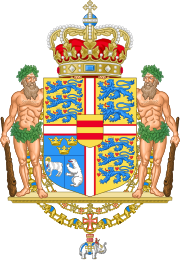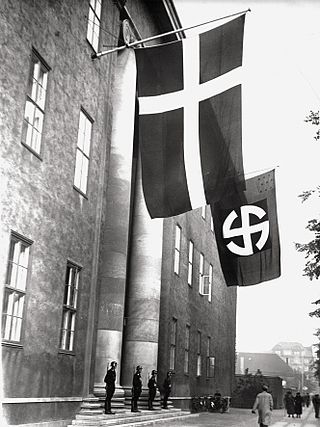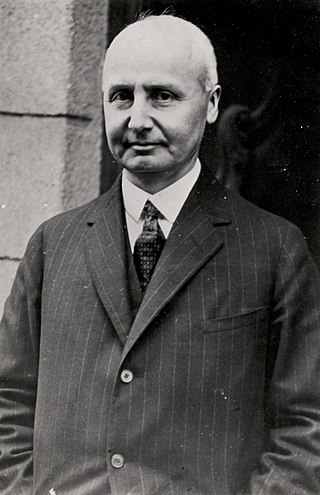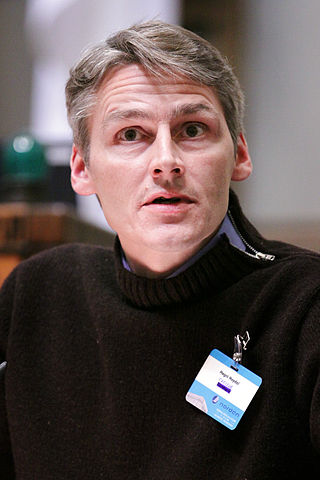 |
|---|
This is a list of foreign ministers of Denmark since the establishment of the Ministry of Foreign Affairs in 1848.
 |
|---|
This is a list of foreign ministers of Denmark since the establishment of the Ministry of Foreign Affairs in 1848.
| No. | Portrait | Name (born–died) | Term of office | Political party | Government | Ref. | |||
|---|---|---|---|---|---|---|---|---|---|
| Took office | Left office | Time in office | |||||||
| 1 | Frederik Marcus Knuth (1813–1856) | 22 March 1848 | 16 November 1848 | 239 days | Independent | Moltke I | |||
| 2 | Adam Wilhelm Moltke (1785–1864) | 16 November 1848 | 6 August 1850 | 1 year, 263 days | Independent | Moltke II | |||
| 3 | Holger Christian Reedtz (1800–1857) | 6 August 1850 | 18 October 1851 | 1 year, 73 days | Independent | Moltke II–III | |||
| 4 | Christian Albrecht Bluhme (1794–1866) | 18 October 1851 | 12 December 1854 | 3 years, 55 days | Independent | Moltke IV Bluhme I Ørsted | |||
| 5 | Wulff Scheel-Plessen (1809–1876) | 12 December 1854 | 15 January 1855 | 34 days | Independent | Bang | |||
| 6 | Ludvig Nicolaus von Scheele (1796–1874) | 15 January 1855 | 17 April 1857 | 2 years, 92 days | Independent | Bang Andræ | |||
| 7 | Ove Wilhelm Michelsen (1800–1880) | 17 April 1857 | 10 July 1858 | 1 year, 84 days | Independent | Andræ Hall I | |||
| 8 | Carl Christian Hall (1812–1888) | 10 July 1858 | 2 December 1859 | 1 year, 145 days | National Liberal | Hall I | |||
| 9 | Carl Frederik Blixen-Finecke (1822–1873) | 2 December 1859 | 24 February 1860 | 84 days | Independent | Rotwitt | |||
| (8) | Carl Christian Hall (1812–1888) | 24 February 1860 | 31 December 1863 | 3 years, 310 days | National Liberal | Hall II | |||
| No. | Portrait | Name (born–died) | Term of office | Political party | Government | Ref. | |||
|---|---|---|---|---|---|---|---|---|---|
| Took office | Left office | Time in office | |||||||
| 10 | Ditlev Gothard Monrad (1811–1887) | 31 December 1863 | 8 January 1864 | 1 year, 263 days | National Liberal | Monrad | |||
| 11 | George Quaade (1813–1889) | 8 January 1864 | 11 July 1864 | 185 days | Independent | Monrad | |||
| (4) | Christian Albrecht Bluhme (1794–1866) | 11 July 1864 | 6 November 1865 | 1 year, 118 days | Independent | Bluhme II | |||
| 12 | Christian Emil Krag-Juel-Vind-Frijs (1817–1896) | 6 November 1865 | 28 May 1870 | 4 years, 203 days | National Landowners | Frijs | |||
| 13 | Otto Rosenørn-Lehn (1821–1892) | 28 May 1870 | 11 June 1875 | 5 years, 14 days | National Landowners | Holstein-Holsteinborg Fonnesbech | |||
| 14 | Frederik Moltke (1825–1875) | 11 June 1875 | 1 October 1875 | 112 days | National Landowners | Estrup Cabinet | |||
| (13) | Otto Rosenørn-Lehn (1821–1892) | 10 November 1875 | 21 May 1892 | 16 years, 193 days | National Landowners | Estrup Cabinet | |||
| 15 | Tage Reedtz-Thott (1839–1923) | 3 June 1892 | 23 May 1897 | 4 years, 354 days | Højre | Estrup Cabinet Reedtz-Thott Cabinet | |||
| 16 | Niels Frederik Ravn (1826–1910) | 23 May 1897 | 27 April 1900 | 2 years, 339 days | Højre | Hørring | |||
| 17 | Hannibal Sehested (1842–1924) | 27 April 1900 | 24 July 1901 | 1 year, 88 days | Højre | Sehested | |||
| 18 | Johan Henrik Deuntzer (1845–1918) | 24 July 1901 | 14 January 1905 | 3 years, 174 days | Venstre Reform | Deuntzer | |||
| 19 | Frederik Raben-Levetzau (1850–1933) | 14 January 1905 | 12 October 1908 | 3 years, 272 days | Venstre Reform | Christensen I Cabinet–II | |||
| No. | Portrait | Name (born–died) | Term of office | Political party | Government | Ref. | |||
|---|---|---|---|---|---|---|---|---|---|
| Took office | Left office | Time in office | |||||||
| 20 | William Ahlefeldt-Laurvig (1860–1923) | 12 October 1908 | 28 October 1909 | 1 year, 16 days | Venstre Reform | Neergaard I Cabinet Holstein-Ledreborg Cabinet | |||
| 21 | Erik Scavenius (1877–1962) | 28 October 1909 | 5 July 1910 | 250 days | Social Liberals | Zahle I Cabinet | |||
| (20) | William Ahlefeldt-Laurvig (1860–1923) | 5 July 1910 | 21 June 1913 | 2 years, 351 days | Venstre | Berntsen Cabinet | |||
| No. | Portrait | Name (born–died) | Term of office | Political party | Government | Ref. | |||
|---|---|---|---|---|---|---|---|---|---|
| Took office | Left office | Time in office | |||||||
| 22 | Edvard Brandes (1847–1931) | 21 June 1913 | 24 June 1913 | 3 days | Social Liberals | Zahle II Cabinet | |||
| (21) | Erik Scavenius (1877–1962) | 24 June 1913 | 30 March 1920 | 6 years, 280 days | Social Liberals | Zahle II | |||
| 23 | Henri Konow (1862–1939) | 30 March 1920 | 5 April 1920 | 6 days | Independent | Liebe | |||
| 24 | Otto Scavenius (1875–1945) | 5 April 1920 | 5 May 1920 | 30 days | Independent | Friis | |||
| 25 | Harald Scavenius (1873–1939) | 5 May 1920 | 9 October 1922 | 2 years, 157 days | Venstre | Neergaard II | |||
| 26 | Christian Cold (1863–1934) | 9 October 1922 | 23 April 1924 | 1 year, 197 days | Venstre | Neergaard III | |||
| 27 | Carl Moltke (1869–1935) | 23 April 1924 | 14 December 1926 | 2 years, 235 days | Independent | Stauning I Cabinet | |||
| 28 | Laust Jevsen Moltesen (1865–1950) | 14 December 1926 | 30 April 1929 | 2 years, 137 days | Venstre | Madsen-Mygdal | |||
| 29 | Peter Rochegune Munch (1870–1948) | 30 April 1929 | 8 July 1940 | 11 years, 69 days | Social Liberals | Stauning II Cabinet–III–IV–V | |||
| (21) | Erik Scavenius (1877–1962) | 8 July 1940 | 29 August 1943 [1] | 3 years, 52 days | Independent | Stauning VI Cabinet Buhl I Cabinet Scavenius Cabinet | |||
| No Danish government in between August 29, 1943 and May 5, 1945. Office is assumed by the permanent secretary. [1] | |||||||||
| – | Vilhelm Buhl (1881–1954) Acting | 5 May 1945 | 7 May 1945 | 2 days | Social Democrats | Buhl II Cabinet | |||
| 30 | John Christmas Møller (1894–1948) | 7 May 1945 | 7 November 1945 | 184 days | Conservatives | Buhl II Cabinet | |||
| 31 | Gustav Rasmussen (1895–1953) | 7 November 1945 | 30 October 1950 | 4 years, 357 days | Independent | Kristensen Cabinet Hedtoft I Cabinet–II | |||
| No. | Portrait | Name (born–died) | Term of office | Political party | Government | Ref. | |||
|---|---|---|---|---|---|---|---|---|---|
| Took office | Left office | Time in office | |||||||
| 32 | Ole Bjørn Kraft (1893–1980) | 30 October 1950 | 30 September 1953 | 2 years, 335 days | Conservatives | Eriksen Cabinet | |||
| 33 | Hans Christian Hansen (1906–1960) | 30 September 1953 | 8 October 1958 | 5 years, 8 days | Social Democrats | Hedtoft III Hansen I Cabinet–II | |||
| 34 | Jens Otto Krag (1914–1978) | 8 October 1958 | 3 September 1962 | 3 years, 330 days | Social Democrats | Hansen II Kampmann I Cabinet–II | |||
| 35 | Per Hækkerup (1915–1979) | 3 September 1962 | 28 November 1966 | 4 years, 86 days | Social Democrats | Krag I Cabinet–II | |||
| (34) | Jens Otto Krag (1914–1978) | 28 November 1966 | 1 October 1967 | 307 days | Social Democrats | Krag II | |||
| 36 | Hans Tabor (1922–2003) | 1 October 1967 | 2 February 1968 | 124 days | Social Democrats | Krag II | |||
| 37 | Poul Hartling (1914–2000) | 2 February 1968 | 11 October 1971 | 3 years, 251 days | Venstre | Baunsgaard | |||
| 38 | Knud Børge Andersen (1914–1984) | 11 October 1971 | 19 December 1973 | 2 years, 69 days | Social Democrats | Krag III Jørgensen I Cabinet | |||
| No. | Portrait | Name (born–died) | Term of office | Political party | Government | Ref. | |||
|---|---|---|---|---|---|---|---|---|---|
| Took office | Left office | Time in office | |||||||
| 39 | Ove Guldberg (1918–2008) | 19 December 1973 | 13 February 1975 | 1 year, 56 days | Venstre | Hartling Cabinet | |||
| (38) | Knud Børge Andersen (1914–1984) | 13 February 1975 | 1 July 1978 | 3 years, 138 days | Social Democrats | Jørgensen II Cabinet | |||
| 40 | Anker Jørgensen (1922–2016) | 1 July 1978 | 30 August 1978 | 60 days | Social Democrats | Jørgensen II Cabinet | |||
| 41 | Henning Christophersen (1939–2016) | 30 August 1978 | 26 October 1979 | 1 year, 57 days | Venstre | Jørgensen III Cabinet | |||
| 42 | Kjeld Olesen (1932–2024) | 26 October 1979 | 10 September 1982 | 2 years, 319 days | Social Democrats | Jørgensen IV Cabinet–V | |||
| 43 | Uffe Ellemann-Jensen (1941–2022) | 10 September 1982 | 25 January 1993 | 10 years, 137 days | Venstre | Schlüter I Cabinet–II–III–IV | |||
| 44 | Niels Helveg Petersen (1939–2017) | 25 January 1993 | 21 December 2000 | 7 years, 331 days | Social Liberals | Poul Nyrup Rasmussen I Cabinet–II–III–IV | |||
| 45 | Mogens Lykketoft (born 1946) | 21 December 2000 | 27 November 2001 | 341 days | Social Democrats | Poul Nyrup Rasmussen IV Cabinet | |||
| 46 | Per Stig Møller (born 1942) | 27 November 2001 | 23 February 2010 | 8 years, 88 days | Conservatives | Anders Fogh Rasmussen I Cabinet–II–III Lars Løkke Rasmussen I Cabinet | |||
| 47 | Lene Espersen (born 1965) | 23 February 2010 | 3 October 2011 | 1 year, 222 days | Conservatives | Lars Løkke Rasmussen I Cabinet | |||
| 48 | Villy Søvndal (born 1952) | 3 October 2011 | 12 December 2013 | 2 years, 70 days | SF | Helle Thorning-Schmidt I Cabinet | |||
| 49 | Holger K. Nielsen (born 1950) | 12 December 2013 | 30 January 2014 | 49 days | SF | Thorning-Schmidt I Cabinet | |||
| 50 | Martin Lidegaard (born 1966) | 30 January 2014 | 28 June 2015 | 1 year, 149 days | Social Liberals | Thorning-Schmidt II Cabinet | |||
| 51 | Kristian Jensen (born 1971) | 28 June 2015 | 28 November 2016 | 1 year, 153 days | Venstre | Lars Løkke Rasmussen II Cabinet | |||
| 52 | Anders Samuelsen (born 1967) | 28 November 2016 | 27 June 2019 | 2 years, 211 days | Liberal Alliance | Lars Løkke Rasmussen III Cabinet | |||
| 53 | Jeppe Kofod (born 1974) | 27 June 2019 | 15 December 2022 | 3 years, 171 days | Social Democrats | Frederiksen I Cabinet | |||
| 54 | Lars Løkke Rasmussen (born 1964) | 15 December 2022 | Incumbent | 1 year, 359 days | Moderates | Frederiksen II Cabinet | |||

The foreign policy of Denmark is based on its identity as a sovereign state in Europe, the Arctic and the North Atlantic. As such its primary foreign policy focus is on its relations with other nations as a sovereign state compromising the three constituent countries: Denmark, Greenland and the Faroe Islands. Denmark has long had good relations with other nations. It has been involved in coordinating Western assistance to the Baltic states.

Denmark is a Nordic country in the south-central portion of Northern Europe with a population of nearly 6 million;(770,000 live in Copenhagen and 1.9 million in the capital region). It is the metropolitan part, and most populous constituent part of, the Kingdom of Denmark, a constitutionally unitary state that includes the autonomous territories of the Faroe Islands and Greenland in the North Atlantic Ocean. Metropolitan Denmark is the southernmost of the Scandinavian countries, lying south-west and south of Sweden, south of Norway, and north of Germany, with which it shares a short border.

The prime minister of Denmark is the head of government in the Kingdom of Denmark comprising the three constituent countries: Denmark, Greenland and the Faroe Islands. Before the creation of the modern office, the kingdom did not initially have a head of government separate from its head of state, namely the monarch, in whom the executive authority was vested. The Constitution of 1849 established a constitutional monarchy by limiting the powers of the monarch and creating the office of premierminister. The inaugural holder of the office was Adam Wilhelm Moltke.

At the outset of World War II in September 1939, Denmark declared itself neutral, but that neutrality did not prevent Nazi Germany from occupying the country almost immediately after the outbreak of war; the occupation lasted until Germany's defeat. The decision to occupy Denmark was taken in Berlin on 17 December 1939. On 9 April 1940, Germany occupied Denmark in Operation Weserübung. The Danish government and king functioned in a relatively normal manner until 29 August 1943, when Germany placed Denmark under direct military occupation, which lasted until the Allied victory on 5 May 1945. Contrary to the situation in other countries under German occupation, most Danish institutions continued to function relatively normally until 1945. Both the Danish government and king remained in the country in an uneasy relationship between a democratic and a totalitarian system until 1943 when the Danish government stepped down in protest against German demands that included instituting the death penalty for sabotage.
The Social Democrats is a social democratic political party in Denmark. A member of the Party of European Socialists, the Social Democrats have 50 out of 179 members of the Danish parliament, Folketing, and three out of fourteen MEPs elected from Denmark.

Erik Julius Christian Scavenius was the Danish foreign minister from 1909 to 1910, 1913 to 1920 and 1940 to 1943, and prime minister from 1942 to 1943, during the occupation of Denmark until the Danish elected government ceased to function. He was the foreign minister during some of the most important periods of Denmark's modern history, including the First World War, the plebiscites over the return of northern Schleswig to Denmark, and the German occupation. Scavenius was a member of the Landsting from 1918 to 1920 and from 1925 to 1927 representing the Social Liberal Party. He was chairman of its party organization from 1922 to 1924.

The Danish Social Liberal Party is a social-liberal political party in Denmark. The party was founded as a split from the Venstre Reform Party in 1905.

Høgni Karsten Hoydal, commonly called Høgni Hoydal, is a Faroese politician. He currently serves as Deputy Prime Minister of the Faroe Islands and Minister of Foreign Affairs and Trade. He has been the party leader of Tjóðveldi since 1998.

Capital punishment in Denmark was abolished in 1933, with no death sentences having been carried out since 1892, but restored from 1945 to 1950 in order to execute Nazi collaborators. Capital punishment for most instances of war crimes was abolished in 1978. The last execution was carried out in June 1950.

The Danish Ministry of Transport is the Danish ministry in charge of coordinating and realizing the transport politics of Denmark.

The Danish Realm, officially the Kingdom of Denmark, or simply Denmark, is a sovereign state consisting of a collection of constituent territories united under the monarch of Denmark, which functions as head of state. It consists of metropolitan Denmark—the kingdom's territory in continental Europe and sometimes called "Denmark proper" —and the realm's two autonomous regions: the Faroe Islands in the North Atlantic and Greenland in North America. The relationship between the three parts of the Kingdom is known as Rigsfællesskabet.

Icelandic–British relations are foreign relations between Iceland and the United Kingdom.

The politics of Denmark take place within the framework of a parliamentary representative democracy, a constitutional monarchy and a decentralised unitary state in which the monarch of Denmark, King Frederik X, is the head of state. Denmark is a nation state. Danish politics and governance are characterized by a common striving for broad consensus on important issues, within both the political community and society as a whole.

Denmark–Switzerland relations refers to the current and historical relations between Denmark and Switzerland. Denmark has an embassy in Bern. Switzerland has an embassy in Copenhagen, but only offers consular services from the Nordic Regional Consular Centre in Stockholm. Diplomatic relations between Denmark and Switzerland were established in 1945.